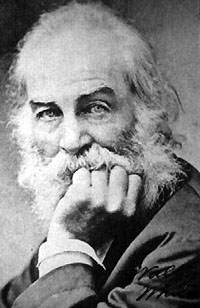LITR 4232 American
Renaissance

Whitman, “When Lilacs Last in the Dooryard Bloom’d”
Tuesday, 18 November: Abraham Lincoln 1627-37: "House Divided speech," “Gettysburg Address,” + “Second Inaugural Address.” Research Project due.
Text-Objective Discussion: Cathrine Marie Nunn
Thursday, 20 November: conclude Whitman: “When Lilacs Last in the Dooryard Bloom’d” 2282-8
Text-Objective Discussion: Lisa Wilson
Tuesday, 25 November: Emily Dickinson first meeting
Introduction 2554-58; Poems: "I like a look of Agony" (2558); "Wild Nights" (2565); "There's a certain slant of light" (2567); "I felt a Funeral, in my Brain" (2568)
Text-Objective Discussion: Bethany Roachell
Tuesday, 2 December: Emily Dickinson second meeting
Poems: "I never lost
as much but twice" (2558); "These are the days when Birds come back--" (2559);
"Come
Slowly--Eden!"; "I'm Nobody! Who are you?"
Text-Objective Discussion: Elyse Christine Martinez
Thursday, 4 December: Emily Dickinson fourth meeting
Poems: "I heard a Fly buzz--when I died--" (2579); "This World is not Conclusion" (2572); "I started Early--Took my Dog--" (2582); "I cannot live with You--"; "Because I could not stop for Death--" (2578); "A narrow Fellow in the Grass" [riddle poem] (2588); "A Route of Evanescence" [riddle poem] (2591)
Text-Objective Discussion: Gena Martinez
Tuesday, 9 December, 10:00am-12:50pm: final exam (in-class or email)
Instructor's question on "Lilacs"
How is the poem typical of Whitman from Song of Myself and "Crossing Brooklyn Ferry?"
What has changed in Whitman's style?
Why doesn't the poem name Lincoln?
Why the emphasis on "song?"
What exactly happens in the swamp with the bird?
What kind of reconciliation or acceptance is achieved? How?
enriched or heightened common speech
cf. Lincoln
Dickinson assignments
What images of Dickinson prevail in popular mind? How do people think of her?
Somewhat divided response:
some find Dickinson and her poetry fascinating
some dismiss her and her poetry as odd
What are attractions / repulsions of both Dickinson and her poetry?
What do our attractions / repulsions reveal about ourselves?
Dickinson style handout (print copies forthcoming Tuesday)
preview "Lilacs"; "catalog"
two purposes in reading "Lilacs"
elegy for USA's greatest president
USA as democracy
identification, absorbs other identities, comes to terms with similarity and difference
continue study of Whitman's style
"free verse," but still poetry
What techniques?
parallelism
catalog
symbol
Whitman's "Lilacs"--elegy / eulogy on President Lincoln
"elegy" also a sub-genre of lyric poetry
poetic form of "eulogy": speech genre: remembrance / tribute / lesson at a funeral
"Lilacs" as Whitman's most mature or perfect poem
continues breakthrough style (Section 11: catalog + parallelism)
continues themes of "one and many, individual and community"
not for you alone
elegy / eulogy as meaning of death for all
+ sophisticated development, elaboration of symbols
cf. Melville (ship as microcosm), Hawthorne (veil as sin)
important Modern style--symbols speak and carry meaning to variety of readers
SYMBOLS
In "When Lilacs . . . "
Lilacs
Bird
Star
Song
Dooryard
Dark mother (death)
"Trinity"
Questions:
What is the trinity of symbols in "Lilacs?"
Why doesn't the poem name Lincoln?
Why the emphasis on "song?"
Defining symbols
image + cultural or traditional meaning
image = something that communicates to the senses; most often sight
e. g., the denotation of "star" is first and foremost a luminous heavenly object, but humans are meaning-seekers, so attachments or connotations rapidly gather . . . .
Walt Whitman, Specimen Days. Prose Works 1892, v. 1, ed. Floyd Stovall (New York UP, 1963)
94 "The Weather—Does it Sympathize with these Times?"
Whether the rains, the heat and cold, and what underlies them all, are affected with what affects man in masses, and follows his play of passionate action, strain'd stronger than usual, and on a larger scale than usual—whether this, or no, it is certain that there is now, and has been for twenty months or more, on this American continent north, many a remarkable, many an unprecedented expression of the subtile air above us and around us. There, since this war, and the wide and deep national agitation, strange analogies, different combinations, a different sunlight, or absence of it; different products even out of the ground. After every great battle, a great storm. Even civic events the same. On Saturday last . . . . As the President came out on the capitol portico, a curious little white cloud, the only one in that part of the sky, appear'd like a hovering bird, right over him.
Indeed, the heavens, the elements, all the meteorological influences, have run riot for weeks past. Such caprices, abruptest alternation of frowns and beauty, I never knew. . . . Nor earth nor sky ever knew spectacles of superber beauty than some of the nights lately here. The western star, Venus, in the earlier hours of the evening, has never been so large, so clear; it seems as if it told something, as if it held rapport indulgent with humanity, with us Americans. Five or six nights since, it hung close by the moon, then a little past its first / 95 quarter. The star was wonderful, the moon like a young mother. The sky, dark blue, the transparent night, the planets, the moderate west wind, the elastic temperature, the miracle of that great star, and the young and swelling moon swimming in the east, suffused the soul. . . . .
67 "A Silent Night Ramble" (Oct 20th)
Tonight, after leaving the hospital . . . .
The sky, the planets, the constellations, all so bright, so calm, so expressively silent, so soothing, after those hospital scenes.
Why doesn't the poem name Lincoln?
Makes the poem about more than Lincoln?
Everyone would have known anyway?
